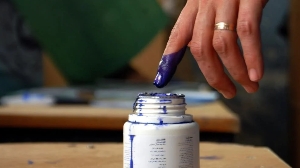The Electoral Commission (EC) has faced backlash from various people and institutions over its proposal to scrap the use of indelible ink in the upcoming 2024 general elections.
The indelible ink, which is applied to voters’ fingers after they cast their ballots, is meant to prevent multiple voting and enhance the credibility of the electoral process.
However, the EC in its Constitutional Instrument (CI) for the 2024 elections, stated that it intends to do away with the ink, citing the biometric verification system as a more reliable and efficient method of identifying voters.
The EC’s chairperson, Jean Mensa, said at a press conference on December 18, 2023, that the indelible ink was no longer necessary, as the biometric technology would flag anyone who attempts to vote more than once.
However, the EC’s proposal has been met with strong opposition and criticism from various quarters, who have questioned the rationale and legality of the decision.
Some of the people and institutions who have spoken against the EC’s plan include:
National Democratic Congress
Being the main opposition party in Ghana, the NDC was the first to speak against the proposal by the EC.
Party’s stated reason is that the proposal by the EC is a ploy to rig the 2024 elections in favour of the New Patriotic Party (NPP).
Addressing the issue during a press conference held at the NDC headquarters in Adabraka on Monday, January 8, 2024, the National Chairman of the NDC, Johnson Asiedu Nketiah, highlighted the multifaceted role of indelible ink in elections.
He stated that it serves as a visible and transparent means of verifying voters in addition to the biometric verification already in place.
“The NDC strongly opposes the removal of indelible ink because it visibly, transparently, and physically verifies voters in addition to biometric verification. Indelible ink marks and identifies voters to discourage and prevent them from engaging in multiple voting, particularly when there is apathy,” Nketiah indicated.
Questioning the rationale behind abandoning a well-established and effective verification system, Nketiah urged the Electoral Commission to reconsider its decision.
“Why do away with this multi-layered, tried and tested verification system that adds additional credibility to Ghana’s electoral process?” he quizzed.
Global Security for Africa Research and Good Governance (GLOSARGG)
GLOSARGG warned the Electoral Commission (EC) to reverse the idea not to use indelible ink in elections.
According to the group, EC's decision not to use indelible ink is not politically and electoral friendly.
The Secretary of GLOSARGG, Francis Ahovi, said: "The EC's opinion not to use the indelible ink during the General Elections is another avenue to deepen the already existing untrustworthy and electoral fraud in Ghana.''
He added "Even with indelible ink, some unscrupulous voters still do multiple voting for their parochial gains, if the proposal of the EC is not well thought through, could be suicidal and probably leave some indelible doom on the fortunes of our electoral system. Hence, it must be avoided."
Security and safety analyst, Dr Adam Bonaa
Dr Adam Bonaa described the decision by the EC as one that has not been properly thought through.
Speaking to GhanaWeb in an interview, Dr Bonaa stated that the use of indelible ink to distinguish between voters who have exercised their franchise goes to the heart of election security and will thus form the basis for mayhem if the decision is implemented.
“It looks like the policy is not a well thought through policy. If you look at the issues we have when it comes to public elections in this country, they are issues to do with mistrust, distrust and suspicion.
"You don’t want a situation where you are going to have an all-out confrontation amongst the citizenry vis-a-vis the EC officials and the security officers who are supposed to be manning the polling centres. So to say that the indelible ink is not going to be used again is almost saying you are calling for an all-out war on election day because looking at the issues going into election 2024, there is suspicion everywhere,” he stated.
Senior Member of the NPP, Nana Akomea
Surprisingly, a senior member of the ruling NPP, Nana Akomea, asked the EC to abandon the proposal on the use of indelible ink during elections.
Nana Akomea asked the EC to rethink their decision, explaining that though this is a good initiative, it is advisable to weigh the pros and cons of ensuring the system is foolproof.
He noted that machines are not entirely fail-safe, so wondered if the EC authentication system is fully reliable.
"These are machines. It can be faulty anytime...If the EC says it won't use the india ink again, they should be careful...You can't rely on them (machines) 100%," he stated.
Political analyst, Dr. Jonathan Asante Otchere
Political analyst, Dr. Jonathan Asante Otchere, called on the EC to listen to the arguments being made by interest parties regarding the use of indelible ink.
To him, if the EC’s decision will not solve any problem, then there is no need to implement such a policy at all.
“The EC does not conduct elections for itself, it conducts for stakeholders who have invested so much financially and of course in terms of human resources and other inputs to ensure they get the desired results not only for themselves but also for those who follow them.
“The other issue is, what problem is the EC trying to solve? Is there any problem? Of course, from the argument of the EC we are told that gone are the days where we do not have biometrics and the fact that now that we do, there is no need for this ink but the question is, has the Chairperson of the Commission demonstrated that at the IPAC? If she has, then I am not aware of that. If she did, on what grounds did the stakeholders accept the position?
“... What then is the basis for the EC to now use an indelible ink when it comes to the internal election of the NPP? So it defeats the very purpose they decided to do away with the indelible ink,” he stated.
Other political parties
The People's National Convention (PNC) and the Great Consolidated People's Party (GCPP) raised objections to the Electoral Commission's (EC) decision to phase out the use of indelible ink in identifying voters, a measure aimed at preventing multiple voting.
According to representatives of the PNC and GCPP, the issue was never thoroughly discussed during the last Inter-Party Advisory Committee (IPAC) meeting that followed the EC's limited registration exercise.
NW/OGB
General News of Wednesday, 7 February 2024
Source: www.ghanaweb.com













